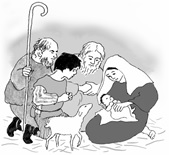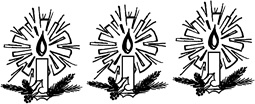Isaiah 9:2-7, Titus 2:11-14, Luke 2:1-7
In the name of God, loving Father, risen Son and ever-present Holy Spirit. Amen
Over the last couple of years, the run up to Christmas has been much less rushing around like a headless chicken in my world! Last year we were very limited on what we could do because of COVID and levels were such that promises made for celebrations were reduced or dashed completely as the big day approached! This year there has been a good deal more going on (still not like it was in the headless chicken pre-pandemic days), but still with the omicron variant of COVID looming rather badly! Good job we didn’t know that last year!
This year I did attend a couple of rehearsals and the filmed performance of a school nativity play. Unusually I was the live audience of one! Controlling the sound (and it was taking place in one of my churches). Everyone else who watched it did so from a video! We have done a little more in the way of special services, praying hard our events don’t spread the virus. We have sung the carols inside that we so missed last year.
Several times in the last few months, I have seen threats of Christmas being cancelled sprawled across the papers, but Christmas and what it means to us can never be cancelled as it is a matter of the heart and faith. It wasn’t cancelled last year either! We may have much reduced or no gatherings and are still not able to connect with every tradition we have built up over the years, but the reason for the season of Christmas remains intact and whole in our hearts by faith.
 We do whatever we can because 2000 years ago a baby was laid in a manger because there was no place in the inn and that baby was the son of God – Jesus – Emmanuel God with us. That is written on our hearts and kept alive through our faith. But as a society we have put layers and layers on top of this event, so it is possible to celebrate Christmas with no mention of the Christ child. It can be all about robins, holly and ivy, Rudolf, and snowmen! It can be all about the glitter and the tinsel, and have no substance.
We do whatever we can because 2000 years ago a baby was laid in a manger because there was no place in the inn and that baby was the son of God – Jesus – Emmanuel God with us. That is written on our hearts and kept alive through our faith. But as a society we have put layers and layers on top of this event, so it is possible to celebrate Christmas with no mention of the Christ child. It can be all about robins, holly and ivy, Rudolf, and snowmen! It can be all about the glitter and the tinsel, and have no substance.
I also worry about the pressures we can put upon ourselves, the need to have a perfect Christmas is one of them. Where we look perfect, everything we cook is perfect, where everyone loves all their presents and everyone gets on for the duration of the festival. Perfection is not the aim of a celebration of Christmas, but marking God’s intimate and profound love for us that Jesus was born as the son of God to save us. To bring us deeper into God’s amazing love for us. Jesus’ love for us is perfect, whole and complete, but pressurizing ourselves into unrealistic visions of perfect family Christmas isn’t helpful. This is particularly difficult if family circumstances have broken down or we have lost someone special to us and all the more if their loss is covid related!
If it helps to bring this home about not seeking perfection – the first Christmas was far from perfect too for Mary and Joseph. Having a baby far from home in a stable is really less than ideal!!!
Striving for perfection was my first concern, my second concern is that we are ‘romanticising’ the events of when Christ was born and therefore diluting the message. For example, I really enjoyed the school nativity in this church, though this one didn’t – these shows often suggest the stable was clean and warm. It doesn’t really need me to tell you that this would not have been the case in all honesty.
Also, for obvious reasons at the school nativity the baby was revealed from inside the manger. When the big moment came Mary picked him up from where he was concealed in the bottom of the manger. Easier to explain but not the reality! As I understand it having a baby is a rather more painful and prolonged business than that!! And I don’t imagine any of you who have had babies fancy doing it in a stable of all places.
If we dilute the story of Christmas or get caught up in the perfection quest, what we lose is the cost, the jeopardy and the vulnerability and the reality of it. God’s heart of love for us within it all.
For example, Mary’s acceptance of what was to happen to her (which could have resulted in her being stoned) is important. Trystan Hughes – in the book Real God in the real world (BRF 2013)) wrote
During the Christmas period we remember that this young jewish girl must have been so fearful when she discovered she was expecting. Fearful of rejection, fearful of humiliation and fearful of pain and great risk of childbirth – Yet she turned that difficulty on its head by trusting God putting herself completely in his hands and embracing the wonder of life!
Joseph’s part in this is also pretty radical. Joseph’s acceptance of Mary bearing God’s child is pivotal to God’s plan and a work of God in his heart too. Things would have been very different without Joseph’s part! Also travelling the 40 or so miles to Bethlehem with a heavily pregnant woman would have been hazardous.
What really happened with the shepherds is challenging too! Angel encounters are frightening. Hence the first line of virtually any angel encounter is Do not be afraid. The shepherds were the lowest of the low in society. Yet they acted on what they saw and that sense of God at play in their hearts as the angels praised God around them!
The vulnerability of it all is important. How God’s love won through even in these early days against the odds. Jesus didn’t come to us to save us and bring us his presence and his peace without a significant degree of risk and jeopardy at every turn. If we dilute the story we lose sight of that. Vulnerability opens our hearts in a new way too. Today usually we don’t generally seek out opportunities to be vulnerable. Yet these have been thrust upon us by recent times and circumstances and over a prolonged period!
When we are vulnerable and open hearted, we acknowledge our weaknesses as well as our God given strengths and gifts. We also allow more room in our hearts to find the deeper things of God within ourselves and those around us. This work in our hearts of God’s love for us is why Christmas can never be cancelled!
This night of all nights we need to be open hearted to the love God has for us. Each one of us his special child. For as the prophet Isaiah put it
6For a child has been born for us, a son given to us; authority rests upon his shoulders; and he is named Wonderful Counsellor, Mighty God, Everlasting Father, Prince of Peace. His authority shall grow continually, and there shall be endless peace
To truly understand that Jesus has been born for us, we need to sit with those familiar phrases and chew over each one and feel them deep within ourselves with all our vulnerabilities, frailties and let God’s love fill us afresh. And to live with God’s hope firing our bodies and God’s peace overflowing to those around us.
I am going to end with a poem. You may wish to close your eyes as I read it. It is called You are deeply, deeply loved and it is written by John Harvey and answers the question: – On this night of the year, a voice is speaking – can we hear it?
- On this night of the year, a voice is speaking – can we hear it?
- ‘I know the cares and anxious thoughts of your hearts
- I know the hard times you often give yourselves.
- I know the hopes and ambitions that you have for yourselves and for others.
- I know your doubts too – even while you seek to express your belief.
- On this night, I want to find a way of saying to you:
- You are deeply, deeply loved,
- Just as you are,
- Forgiven, loved and challenged to be the very best you can be.
- So I’m speaking to you in the only way I know – from a stable,
- In a child born into poverty,
- Soon to grow to maturity,
- Born to show you,
- In a human life,
- The love of God’
References
New Revised Standard Version Bible: Anglicised Edition, copyright © 1989, 1995
Real God in a the real world – Trystan Owain Hughes, The BRF Advent book 2013
You are deeply, deeply loved by John Harvey from Candles and conifers edited by Ruth Burgess. Reproduced for use in church and at home Christmas 2021 Wild Goose Publications


